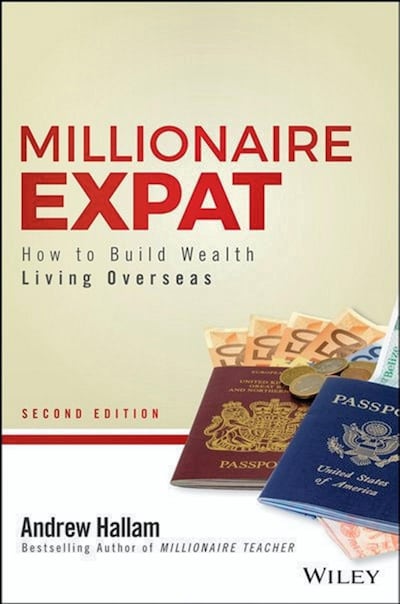The personal finance author and former high school teacher Andrew Hallam is heading back to the UAE later this month as part of his mission to help expatriates invest more effectively.
During the trip he will also be talking about his latest tome, Millionaire Expat: How to Build Wealth Living Overseas, published this month, the second edition of his 2014 book The Global Expatriate's Guide to Investing.
A former Singapore resident, the Canadian has become famous for building up a million-dollar portfolio of low-cost stock and bond market index funds on a teacher’s salary. He now blogs about his experiences and delivers talks to expat investors across the globe.
Last year saw him deliver 60 talks in the Middle East alone as well as attend The National's Money Roundtable in February, which examined whether expensive fixed-term investment plans are still effective in today's market. The event was prompted by numerous letters from The National's readers concerned about being tied to the products, which are sold by financial salespeople and administered by insurance companies.
The millionaire and his wife Pele, are currently travelling by camper van in Mexico. They started their journey in Victoria, British Columbia, on October 5 and are heading to Argentina. However, the writer is breaking the trip to head to the UAE on January 26 to deliver a series of talks in Abu Dhabi and Dubai. His speaking engagements will also take him to Hong Kong and Switzerland. Millionaire Expat: How to Build Wealth Living Overseas is available from Amazon.com for US$15.15.
Why did you write a second edition?
I approached my publisher at the end of 2016, asking if they could produce a cheaper paperback edition. Many of my readers are in the UAE and I know how expensive it is to ship books there, so I wanted to make the book more affordable to order. The publisher said, 'Why not create a second edition?' Second editions rarely have significant alterations and I didn’t want anyone to feel that way, so I poured everything I had into updating my examples, while adding fresh content that answered questions the first edition didn’t. The result is a book that’s about a 40 per cent upgrade. It took me about 10 months to write.
What is new?
In my book’s first edition, I answered 16 commonly asked questions. In this addition, I included 30 commonly asked questions. I also spent more time discussing retirement withdrawal strategies. For example, I answer the question of what would happen if you retired right before a market crash. With academically supported evidence, I outlined how much you could afford to sell each year during your retirement, to ensure the highest odds that the money will last at least 30 to 40 years. In case you’re curious, it might be more than 5 per cent per year … but only if you’re invested in low-cost products.
Studies show that when people buy index funds, they don't tend to speculate as much as those who buy actively managed funds. Index fund investors accept the market's return. As such, they don't tend to buy high and sell low because they have higher conviction that nobody can consistently predict the direction of the market. The book provides evidence suggesting two advantages:
1. Index funds have lower costs, so they outperform most actively managed funds.
2. Because index fund investors speculate less, they earn a rate of return that exceeds the difference in cost between index funds and actively managed funds. Passive index investors don't tend to buy high and sell low to the same degree that investors in actively managed funds do.
_____
Read more:
A man on a financial mission against predatory investment schemes
The Money Roundtable: Do long-term savings products serve their customers or their sellers?
Don’t deal with the cowboys, invest sensibly
______
Many of your stories involve UAE expats. Why is that?
Unscrupulous financial salespeople have targeted expats in the UAE because such expats earn high salaries and they don’t pay UAE-based income tax. This creates an environment of disposable income, and there’s no ban on the commission-paying schemes that are currently obsolete in more highly regulated environments. Unfortunately, we might have a higher percentage of heartbreaking financial stories in the UAE, compared to anywhere else in the world. That’s why I placed such a high focus on the region.
There are potentially some significant changes coming in 2018 to how the life industry is governed by the UAE's Insurance Authority. Will this help clean up the industry here?
It might. Ultimately, consumers (aka investors) have to wise up to the financial exploitation that occurs in the UAE. It’s going to be tough because the expatriate door is an ever-revolving one, providing new meat for financial salespeople. But we, as an expatriate community, need to look out for one another. When a new expat arrives, we need to show them what to watch for, instead of putting the entire responsibility on government regulations that might or might not help.
What has improved since you published the first edition in 2014?
Lower-cost investment products continue to hit the market. We also have some fabulous Sharia-compliant options, as well as some new socially responsible investment index funds. Such funds don’t include stocks in industries such as tobacco, gambling, weapons manufacturing etc. They also tend to be friendlier on the planet. Certain offshore brokerages have also made the investing process easier. Swissquote, for example, now allows expats to buy Vanguard’s Target Date funds directly from them. There’s also a greater number of decent full-service investment companies. Full-service firms, such as AES International, have increased their offerings by offering low-cost portfolios to investors with as little as $10,000. My book has also included a wider array of brokerages for do-it-yourself investors.
What drives your commitment to help expats invest smartly?
I realised, early in life, that there were two things I could do well. I could teach and I could save and effectively invest money. Plenty of educators are dreamers; we want to teach so we can help. I have that same drive. With government and corporate retirement benefits on the wane, people are going to need to save more effectively for their futures. That goes double for expats because most of them don’t contribute to their home countries’ government retirement plans. As a result, they won’t reap the full rewards when they retire. Now couple those same expats’ needs with the world’s worst financial products. I speak and write prolifically to fight such exploitation with financial education.
The National gets a mention in your book, as you attended our roundtable on fixed-term investment plans last year. Why did you attend the session?
I was fascinated to meet some of the big players in the financial services industry in the UAE. I wanted to give a voice to the little guy, to stand up for the everyday person who has been burned by such products in UAE.
Your book has portfolio suggestions for different expat nationalities. How many readers follow your advice?
This edition provides consistent portfolio models for different nationalities, based on their respective tolerance for risk. For example, I give a specific portfolio model for British investors. Based on their risk tolerance, I show five different portfolio allocation models: ranging from very conservative to very aggressive. I think most that have read my books (or heard me speak) end up following my advice. But let’s remember, this isn’t just my advice. If Warren Buffett or a Nobel Prize winner in economics were your neighbour, he would tell you to invest the same way, or find a financial adviser who will invest this way on your behalf.
You are a millionaire yet you live very economically. What is the philosophy behind your lifestyle?
I’ve always tried to spend far less than I earn and I invest the difference. Studies show that the money we spend on material things doesn’t enhance our level of happiness. But money that we spend on experiences does. Time spent with people we love also enhances our happiness. That’s why my wife and I love to spend our money on travel, instead of the latest iPhone or fancy car. By investing effectively, and not chasing material 'stuff', we’ve been able to buy time: time to spend with family, time to travel. After all, time is the only true currency we have, and none of us know when it’s going to run out.
Can you summarise your investment strategy into a five-step plan?
1. Invest every month or every quarter.
2. Put your money in a diversified portfolio of stock and bond market index funds.
3. Rebalance that portfolio once a year, back to its original allocation.
4. Don’t “trade” those indexes for “better opportunities”.
5. Ignore all investment forecasts and don’t panic when markets crash. Just keep adding money every month or quarter.
What would you say to someone looking to use a financial adviser?
If the financial adviser doesn’t exclusively use index funds, then don’t hire that person. Also, ensure that the adviser is regulated to do business in the UAE. Surprisingly, many of them aren’t. You’ll also want to make sure the adviser isn’t just a salesperson. Make sure they’re registered as a CFP (Chartered/Certified Financial Planner).
_____
Read more:
Tightening up a sector primed for stricter control to help consumers
Insurance year in review: life regulations now expected early 2018
Investments year in review: Investors wait for final push on mis-selling regulations
UAE financial advisers feel strain of tighter regulations
______
You are described as a millionaire on a middle-class salary. Can we all achieve that?
For somebody who starts to invest early, absolutely. But for somebody who’s 55 with minimal savings, they won’t likely be able to build a million dollar portfolio by the time they’re 65. That said, by following the principles in my book, they’ll end up with far more retirement wealth than they otherwise would. You’ll never be younger than you are right now and there are some low-cost retirement destinations (explained in my book) that show how people can live like millionaires, even if they aren’t.
What does your personal investment portfolio look like?
We have two portfolios. My wife is American, so her portfolio is invested directly in a US Vanguard Target Retirement 2020 fund. This one fund includes a variety of indexes that Vanguard mechanically rebalances back to its original allocation once a year. It includes a US stock index, an international stock index, a US bond index and an international stock index.
The portfolio under my name is allocated this way: 40 per cent Canadian bond index; 20 per cent Canadian stock index; 20 per cent US stock index; 20 per cent International stock index (including a developed and an emerging market index).
You retired at 44. How can others follow your lead?
To follow my lead, people must start tracking their expenses. It’s easy to do on an app, with their phone. Then, they need to invest regular monthly sums into a low-cost portfolio of index funds. If they can sidestep the material trap that thwarts many expats (I call it expatitis) they can build a surprising amount of wealth over time.
How do you earn money now?
When we quit our full-time jobs in 2014, we planned to live off an inflation-adjusted 4 per cent of our investment portfolio each year. Books don’t pay well, unless you’re somebody like JK Rowling or Stephen King. But I write a weekly column for a US financial services company and I also write for a Canadian national newspaper. I enjoy the mental stimulation, flexibility, and relatively low working hours. Best of all, the writing income has exceeded our expenses, so we haven’t had to dip into our retirement portfolio at all (yet).




